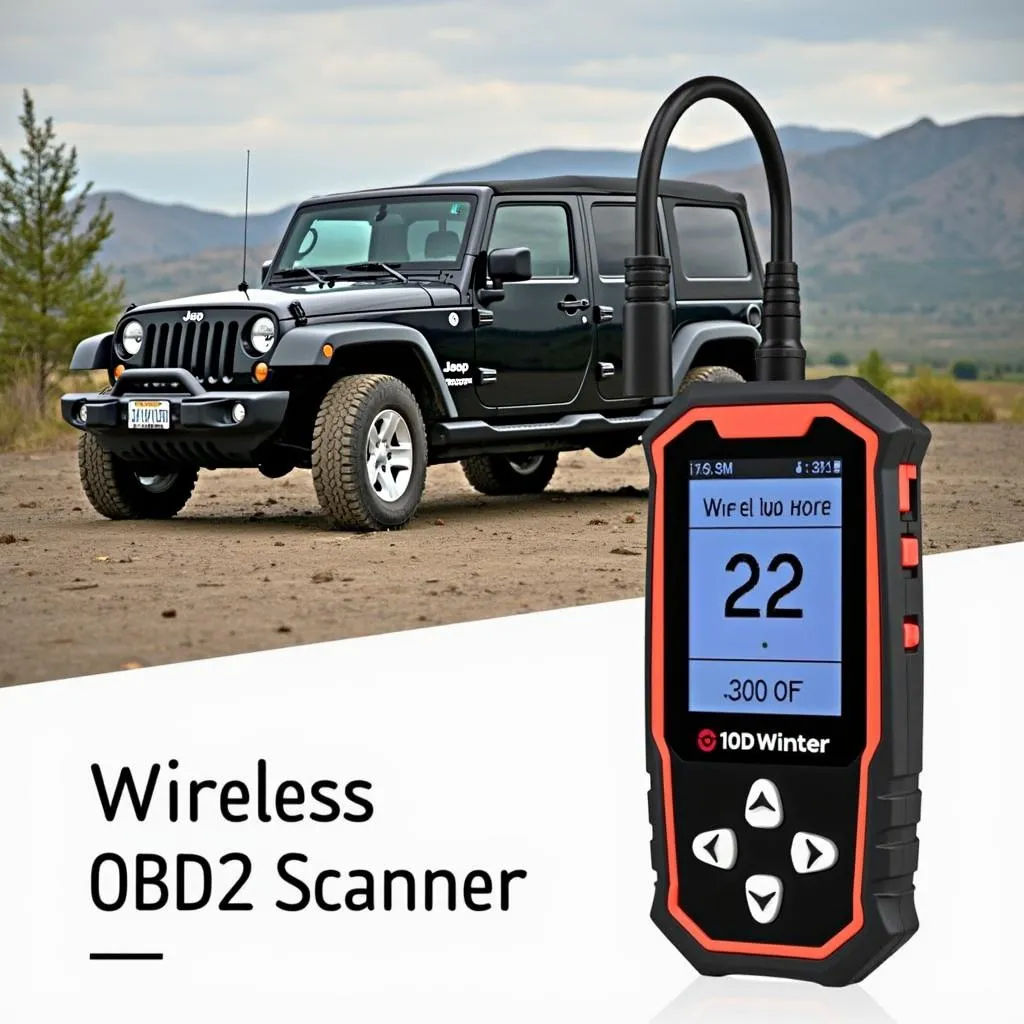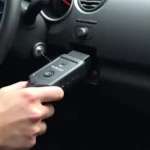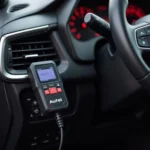Owning a Jeep means embracing adventure and tackling tough terrain. But even the most rugged Jeep can experience the occasional hiccup. That’s where an OBD2 scanner comes in handy. With the right scanner, you can diagnose engine problems, clear pesky check engine lights, and even monitor your Jeep’s performance in real-time. But with so many OBD2 scanners on the market, finding the best one for your Jeep can feel overwhelming.
This comprehensive guide will explore the top OBD2 scanners tailored for Jeep vehicles, arming you with the knowledge to make an informed decision. We’ll delve into the features, benefits, and drawbacks of each option, ensuring you choose the perfect diagnostic tool for your needs.
What to Look for in an OBD2 Scanner for your Jeep
Before we dive into the specifics, it’s important to understand the key factors that make an OBD2 scanner stand out for Jeep owners.
Jeep-Specific Features:
Not all OBD2 scanners are created equal. Some offer enhanced functionalities specifically designed for Jeep vehicles. These may include:
- Jeep-Specific Codes: The ability to read and interpret manufacturer-specific trouble codes that are unique to Jeep vehicles.
- Live Data Parameters: Access to real-time data streams from various sensors in your Jeep, providing in-depth insights into engine performance, transmission function, and more.
- Module Programming: For advanced users, some scanners offer module programming capabilities, allowing you to adjust specific settings and configurations within your Jeep’s computer system.
Ease of Use:
A user-friendly interface is crucial, even for those new to car diagnostics. Look for scanners with:
- Intuitive Menus: Easy-to-navigate menus that make finding information straightforward.
- Clear Display: A bright, legible display that presents data in a clear and organized manner.
- Helpful Resources: Some scanners come with built-in code libraries, troubleshooting guides, or access to online databases for quick reference.
Compatibility:
Ensure the scanner you choose is compatible with your specific Jeep model year. Most modern OBD2 scanners work with a wide range of vehicles, but it’s always best to double-check compatibility before purchasing.
Additional Features:
- Wireless Connectivity: Bluetooth or Wi-Fi connectivity allows you to sync the scanner with your smartphone or tablet for enhanced data logging, analysis, and report generation.
- Battery-Free Operation: Some scanners draw power directly from the OBD2 port, eliminating the need for batteries.
- Software Updates: Regular software updates ensure your scanner remains compatible with the latest vehicle models and diagnostic protocols.
Top OBD2 Scanners for Jeep
Now that you understand the key considerations, let’s explore some of the best OBD2 scanners for Jeep vehicles on the market.
Understanding OBD2 Codes
Once you’ve chosen your OBD2 scanner, it’s time to understand how to interpret the codes it retrieves.
- Types of Codes: OBD2 codes generally fall into four categories:
- P Codes: Powertrain codes, related to the engine, transmission, and emissions systems.
- B Codes: Body codes, related to components like airbags, power windows, and central locking.
- C Codes: Chassis codes, related to the ABS, traction control, and other chassis systems.
- U Codes: Network codes, related to communication issues between the vehicle’s various control modules.
- Code Structure: OBD2 codes consist of a letter and four digits:
- First Character: Indicates the system (P, B, C, U).
- Second Character: Indicates whether the code is generic (0) or manufacturer-specific (1).
- Third Character: Identifies the specific system or sub-system.
- Fourth and Fifth Characters: Pinpoint the specific fault or issue.
Example:
A code “P0301” would indicate a powertrain (P) code, generic (0), related to the ignition system or misfires (3), and specifically a misfire detected in cylinder number 1 (01).
Beyond Diagnostics: How OBD2 Scanners Enhance Your Jeep Experience
While OBD2 scanners excel at diagnosing problems, they offer much more than just troubleshooting.
- Performance Monitoring: Track real-time data such as engine RPM, coolant temperature, oxygen sensor readings, and more to monitor your Jeep’s performance and identify potential issues before they escalate.
- Fuel Efficiency Optimization: Monitor fuel consumption data and driving habits to improve your Jeep’s fuel efficiency.
- Trip Logging and Analysis: Log your driving data, including speed, distance, and fuel consumption, for trip analysis and maintenance tracking.
Conclusion: Empower Yourself with the Right OBD2 Scanner
Investing in a quality OBD2 scanner is a wise decision for any Jeep owner. It empowers you to take control of your vehicle’s health, diagnose problems accurately, and potentially save on costly repairs. By understanding your needs, researching the available options, and leveraging the information in this guide, you can confidently choose the best OBD2 scanner to keep your Jeep running smoothly for years to come.
Frequently Asked Questions
1. Can I use any OBD2 scanner on my Jeep?
While most modern OBD2 scanners work with a wide range of vehicles, it’s crucial to verify compatibility with your specific Jeep model year.
2. What is the difference between a generic and a manufacturer-specific code?
Generic codes (starting with “0”) apply to all OBD2-compliant vehicles, while manufacturer-specific codes (starting with “1”) are unique to a particular car maker, like Jeep.
3. Do I need a professional mechanic to use an OBD2 scanner?
Not necessarily. Many OBD2 scanners are user-friendly, even for those new to car diagnostics. They come with intuitive interfaces, clear instructions, and often have built-in code libraries or online resources for guidance.
4. Can an OBD2 scanner clear my check engine light?
Yes, OBD2 scanners can clear check engine lights after addressing the underlying issue that triggered the code. However, it’s crucial to identify and fix the problem, as simply clearing the code without resolving it may lead to further damage.
5. What are live data parameters, and why are they useful?
Live data parameters are real-time measurements from various sensors in your Jeep, providing insights into engine performance, transmission function, and other vital systems. This data can help pinpoint issues and monitor your Jeep’s overall health.
Do you have any other questions? Check out these other articles:
Need more assistance? Contact our 24/7 customer support team via WhatsApp: +1(641)206-8880, or Email: [email protected].


